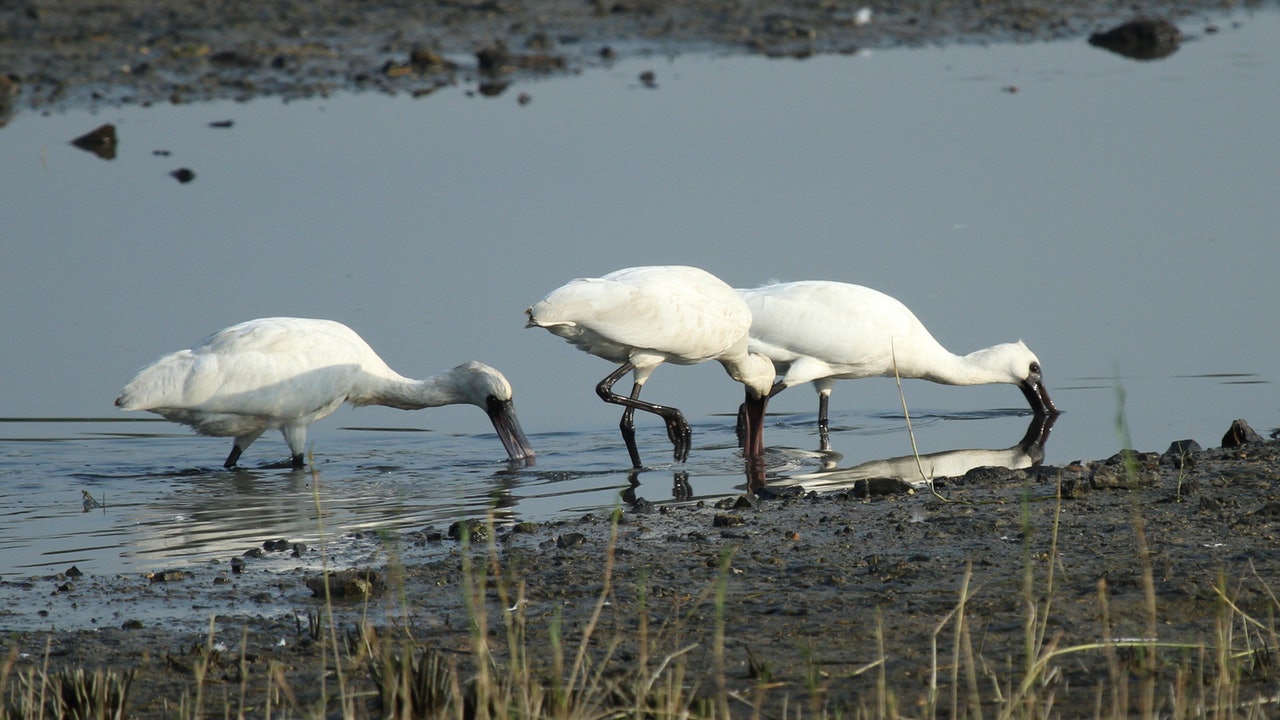Social News
Written by: Golden Chess
2021-04-13 13:28
Last update date: 2021-04-13 13:28
Some of the black-faced spoonbills, which are classified as "endangered" species, spend the winter in the Deep Bay between Hong Kong and Shenzhen. However, investigations have found that the number of black-faced spoonbills inhabiting Deep Bay has decreased significantly in recent years.
The Hong Kong Bird Watching Society has just conducted the 2021 Black-faced Spoonbill Global Census and found that the number of Black-faced Spoonbills in the world this year is the highest on record, reaching 5,222, an increase of 7.4% from last year.
However, the number of black-faced spoonbills inhabiting Hong Kong's Deep Bay has a downward trend. This year, the number of black-faced spoonbills is 336, a decrease of 6.9% compared with last year, and the decline has reached 15% in the past 7 years.
The Hong Kong Bird Watching Association believes that the figures reflect the deterioration of the wetland environment in Hong Kong's Deep Bay, which has reduced the number of black-faced spoonbills visiting Hong Kong.
The association urged the Hong Kong government to guard the "wetland buffer zone" to prevent land development from invading the Deep Bay wetlands and vigorously promote the local pond fish farming industry.
The Hong Kong Bird Watching Society has conducted the "Black-faced Spoonbill Global Simultaneous Census" every year since 1994. This year's survey was completed from January 15 to 17, covering more than 120 locations around the world, including the Deep Bay between Hong Kong and Shenzhen, Japan, Taiwan and Vietnam, etc.
The results showed that the number of black-faced spoonbills in the world reached 5,222, an increase of 7.4% from last year, or an increase of 358; among them, the number of wintering in Taiwan reached 3,132, accounting for the world's largest number of 60%, an increase of 12.5 compared to last year. %.
While the number of black-faced spoonbills in the world has increased significantly, the number of black-faced spoonbills living in Hong Kong has dropped significantly.
This year, 336 black-faced spoonbills were recorded in Deep Bay, and the number fell by 6.9% year-on-year, which is the third consecutive year of decline.
Yu Ridong, senior research manager of the Hong Kong Bird Watching Society, pointed out that the survey revealed that the environmental quality of Deep Bay wetlands has declined, preventing black-faced spoonbills from coming to Hong Kong to inhabit.
Bird Watching: Wetland development and its buffer zone threaten black-faced spoonbill habitat
Yu emphasized that the evaluation of wet geological factors involves measuring many factors, and the number of birds is one of the indicators. Because birds will choose wetlands with good environment to live in, such as wide and shallow water, the number of birds has declined, which is showing Wetland environment change.
He also pointed out that in the past few years, the government and developers have successively proposed to develop the Deep Bay wetland and its buffer zone, destroying the integrity of the Deep Bay wetland ecosystem and threatening the habitat of the black-faced spoonbill.
The Development Bureau pointed out earlier that it will review the planning guidelines for wetland buffer zones within this year.
Yu Ridong expects that the government review should cover the wetland buffer zone, and the important protection function of the wetland conservation area is not just a review of development factors.
He also gave an example that if the height restriction near the wetland is relaxed, it will affect the flight of birds. "It's like a well without birds flying in, so it's difficult to fly out."
As for whether the proposed MTR Northern Link will affect the black-faced spoonbill’s habitat, Yu Ridong pointed out that because the Northern Link runs closer to the inland, the direct impact on Deep Bay is not too great, but due to the increase in population density along the railway, it is not acceptable. Ignoring the cumulative impact, "will definitely put pressure on nearby wetlands."
Endangered Oriental White Stork, more than 7,000 "rare visitors" around the world show up in Deep Bay for bird-watching to reduce disturbance
The Bird Watching Society estimates that there are 260,000 sparrows in Hong Kong that reduce the number of parks and commercial areas or are related to the epidemic
Bird watching club’s first positioning device tracks little egrets staying in Hong Kong throughout the year to promote the conservation of fish ponds and wetlands
Bird watching club staff worry about the increase in bird corpses related to tear gas, bird watching club said it is difficult to confirm
Bird Watching Club census estimates that 300,000 birds advocate the installation of temporary trays to solve the problem of bird's nest feces
01News
Wetland Conservation, Black-faced Spoonbill, Hong Kong Bird Watching Society, Bird Watching

